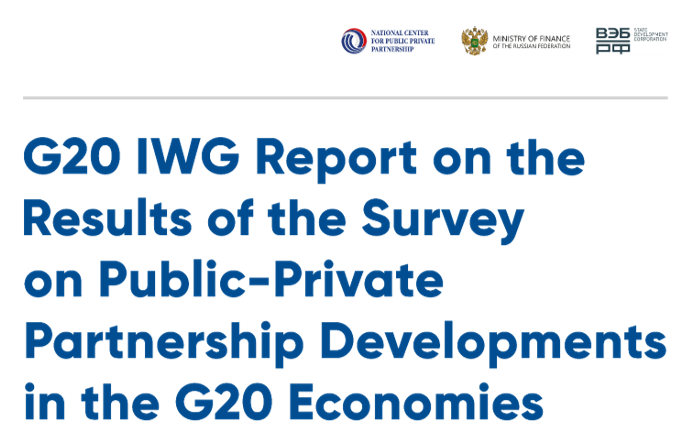916 results found
Featured results



More results

The G20 Infrastructure Working Group (IWG) Survey on PPP Development underlying this Report provides reference on the frameworks for infrastructure financing through Public-Private Partnership in G20 economies


In just a few years, ESG, also known as sustainable or responsible investing, has moved from a slightly idealistic nicheto front-page, a mainstream dimension for investors, one that strongly influences the performance and resilience of their investment over time. This is particularly the case in infrastructure, in view of its wide reaching and long-term consequences for the community.

This paper examines the evolution of infrastructure and the impact of infrastructure investment and public finance shocks on key development indicators and growth performance in the context of middle income countries.

This paper assists project teams in managing climate change risk in the context of water supply and sanitation investment projects.

This document outlines the strategy for Central Asia it envisions rail transport to become a mode of choice for trade: quick, efficient, accessible, and easy to use throughout Central Asia.

This is a new framework for road safety aims to halve the number of fatalities on CAREC road corridors by 2030 (compared to 2010).

This publication looks at how lowering trade barriers on health products can improve health systems.

This policy brief outlines promising ideas to attract instiutional investors to pay for infrastructure they have not convinced pension funds or affluent individuals to invest, especially in emerging economies with untested issuers, The “tax-kicker” bond being proposed here could solve this issue.

This paper focuses on how to improve services by laying out the rationale and steps for cities to achieve bus sector reforms, with case studies, examples and illustrations.

This book provides a comprehensive evaluation of developing country power sector reform, sifting the evidence of whether reforms have contributed to improved sector outcomes.

Lifelines lays out a framework for understanding infrastructure resilience—the ability of infrastructure systems to function and meet users’ needs during and after a natural shock—and it makes an economic case for building more resilient infrastructure.

This report aims to inform water system managers on the importance of andmeasures to build the resilience of water service provision to natural hazards and climate riskswhile ensuring that water systems can safeguard service provision by reducing their exposure tothe risks associated with natural hazards.

This paper, prepared as a sectoral note for the Lifelines report on infrastructure resilience, investigates the vulnerability of the power system to natural hazards and climate change, and provides recommendations to increase its resilience.

This chapter discusses the impact of climate events on various types of digital infrastructure.

This paper, prepared as background material for the Lifelines report on infrastructure resilience, summarizes the main findings on the risk faced by transport networks and users as a result of natural disasters and climate change, and the main recommendations for building more resilient transport networks.

This issue focuses on Urbanization and Infrastructure Development

This note discusses competition and consumer choice in the healthcare sector.

The Global Toolbox provides an interactive inventory of MDB instruments, with their hyperlinks and comprehensive overviews, to support private investment across the globe.

The ITF Transport Outlook provides an overview of recent trends and near-term prospects for the transport sector at a global level as well as long-term prospects for transport demand to 2050.

The International Benchmarking Network for Water and Sanitation Utilities (IBNET) blue book creates a baseline and, at the same time, offers a global vision of the state of the sector in developing countries.





